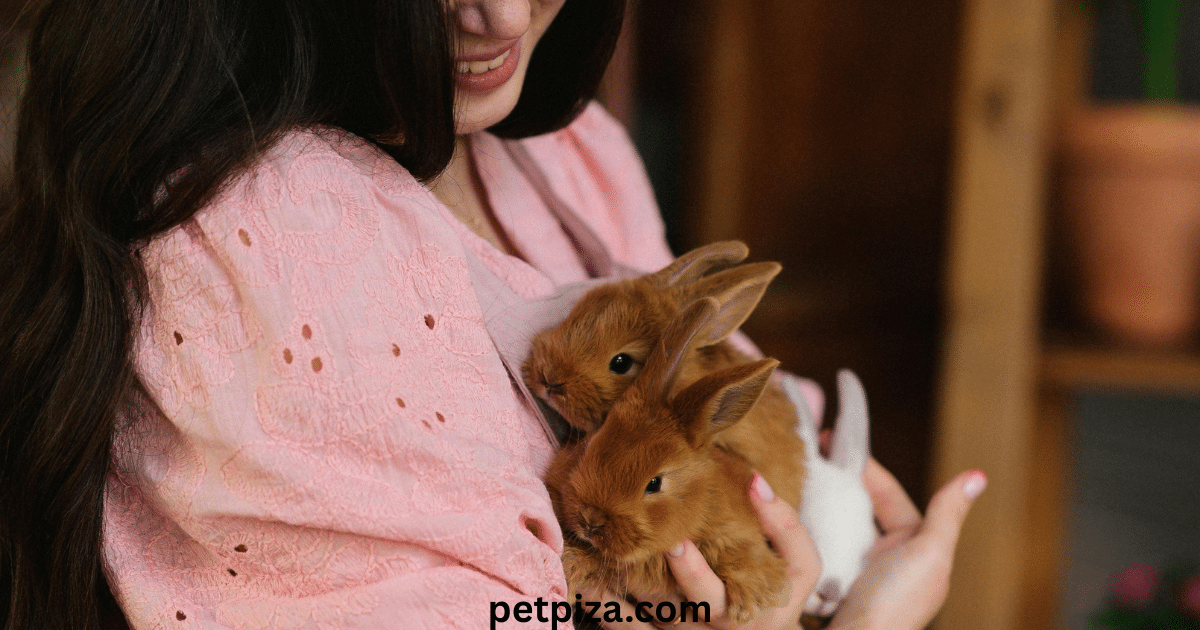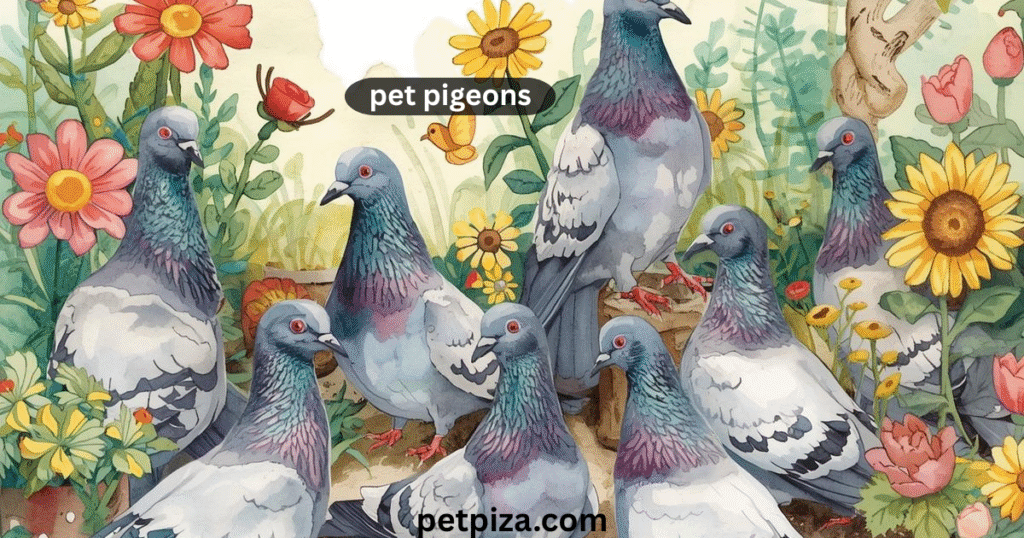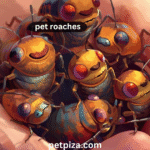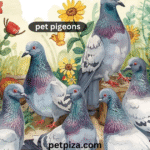Without thinking for too long when you think about a pet what do you think about? A cat? A dog? How about a Pigeon? These cuddly and clever birds have been a part of human companion ship for thousands of years as pets, messengers and racers. If you are asking, “are pigeons good pets?” then you are in the right place. In this case, this guide would be the best for you since we cover every aspect of pet pigeons.
We will cover the basics of pigeon care such as their character, housing, diet, and the rest of their needs. You will understand the pros and cons of pet ownership, the ways to keeping them in good shape, and the means of expenditure to line up for having these astonishing birds in your life. A pet pigeon would be the right companion for you.
Understanding the Pet Pigeon
Misunderstandings can arise since pigeons are more popularly known to the average person as dirty, unclean creatures that wander about city squares, when in actual fact, domestic pigeons do not share these traits. Pigeons have a reputation for being very affectionate, gentle and as an added bonus, capable of forming very strong connections with their owners which adds to their extreme intelligence.
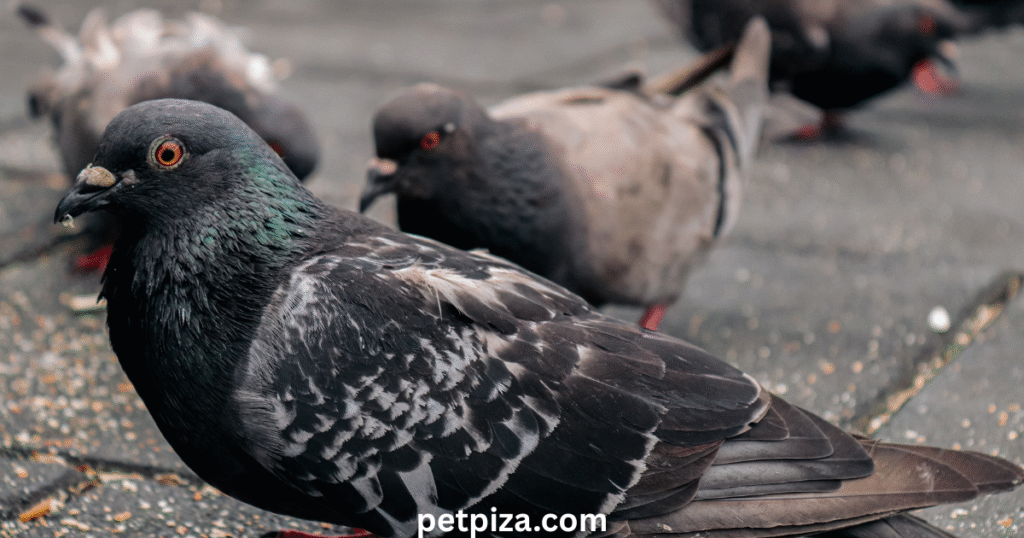
Temperament and Personality
Pigeons are typically more relaxed and easygoing than other types of birds. They do not scream, bite, or cause havoc in the home. They do like a structure and are social animals since they like to coo. Many like to be pet and even more like to perch on the owner’s shoulder or lap.
Pros and Cons of Owning Pet Pigeons
Like any pets, taking care of pigeons comes with a series of advantages and disadvantages.
Pros:
- Affectionate and social: Pigeons are known to become very attached to their caretakers.
- Quiet Companions: They are not loud and do not scream like many other species of pet birds.
- Intelligent: Pigeons are capable of following basic commands and instructions.
- Clean: Pigeons do not produce wet droppings and these are easy to pick up.
- Long Life: A pet pigeon, with the right care, can live up to 15-20 years.
Cons:
- Messy Eaters: Pigeons do not have a clean method of eating and tend to throw food around.
- Housing Requirements: Pigeons need a sturdy and secure structure where they can fly around.
- ‘Pigeon Dust’: Pigeons produce a fine powder, or dander, which can cause issues for allergic individuals.
- Veterinary Care: It can be tricky to find a vet that specializes in birds, especially pigeons.
- Social Requirements: Pigeons need the company of other animals, like their own species, or the owner.
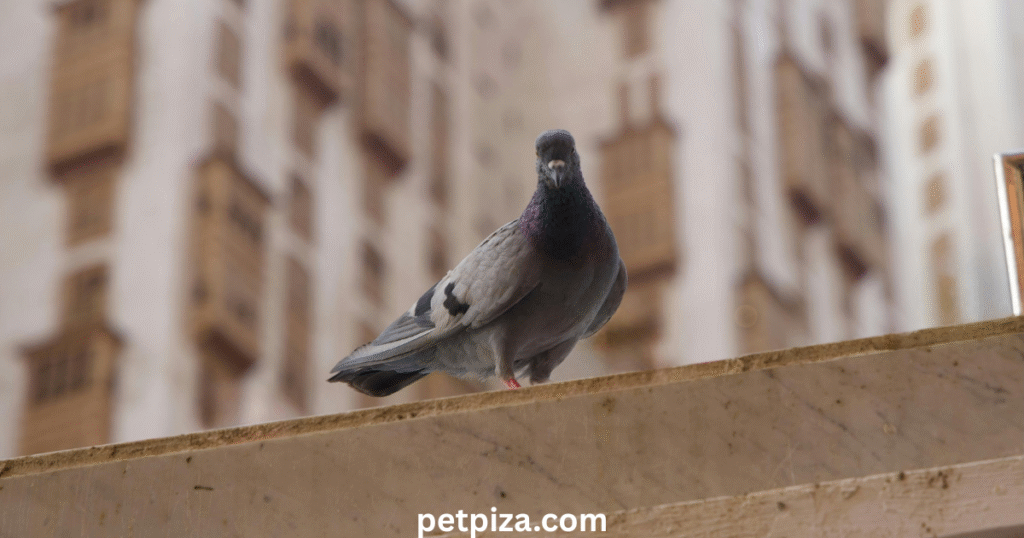
Legal and Ethical Considerations
You should check the legality of owning a pigeon in your area before bringing one home. Some towns and condo associations have policies against keeping birds and outdoor lofts, in particular.
From an ethical standpoint, it is important to either buy your pigeon from a responsible breeder, or from a rescue. You should never pick a wild pigeon off the street. Pigeons are unsocialized to people and can easily have disease. If your potential rescuer pigeon is a non-releasable, that would be a great option, along with obtaining through someone who can no longer take care of their bird.
Pigeon Housing
Proper housing is important to the health and happiness of a pigeon. You have two main choices: staying indoors or in an outdoor loft.
Indoor Housing
If you choose to keep the pigeon indoors, a large dog crate works better than a bird cage. The crate should be large enough so the pigeon can flap and not hit the sides, and the bottom should be lined with paper or puppy pads for easy cleaning.
Pigeon needs to be in a bird-proofed room for several hours a day, with windows, a covered cage, no ceiling fans, and no other potential hazards.
Outdoor Loft or Aviary
A loft is still considered traditional for pigeon keeping since its use is quite advantageous. Its features must include:
- Safekeeping: Every opening on the loft must be covered with strong wire mesh as protection from cats, raccoons, or even hawks.
- Spacious: For every pair of pigeons, there should be an allowance of 4 square feet of floor space.
- Ventilated: Air must be able to flow freely without drafts into the loft to assist the pigeons with respiratory problems.
- Dry: For the pigeons to have good health, the loft must have a roof that is waterproof and the floor should be dry.
An aviary or a large flight cage also has good space and aviary-like characteristics, which make it another suitable choice.

Enrichment and Entertainment
Pigeons can be kept from becoming bored and stressed by doing simple exercises, which is a component of enrichment.
- Perches: Make sure to provide them with perches of different sizes and textures, as feet muscles also need to be exercised.
- Mirrors: Pigeons often enjoy the company of their reflections, as they are quite sociable.
- Shallow Baths: Provide a shallow dish of water for bathing a few times a week as well.
- Foraging Toys: Simple puzzle toys can also be used to hide seeds for them to replicate natural foraging behavior.
Pigeon Diet and Nutrition
Pigeon care is heavily influenced by a balanced, well-rounded pigeon diet, which is also supported by proper nutrition. Feeding a pigeon a diet based on seeds alone is considered malnutrition, as it is insufficient for their health.
Balanced Diet for Pigeons
Every pet should start with a high-quality pigeon seed mix as the bulk of their diet. This should contain all of the basic grains such as millet, corn, wheat, and peas, as well as some legumes.
- Along with the seed mix, the following additions should also be included:
- Grit. Small insoluble bits of granite helps them grind down food in their gizzard.
- Calcium. Crushed oyster shells or a mineral block should be offered, especially to the laying females.
- Chopped Dark Leafy Greens. Small portions of kale, spinach, and the ever-present dandelion greens should work well.
- Fresh Water. Water dishes should be cleaned and refilled on a routine daily basis. Pigeons require a dish so they can submerge their heads in order to suck the water up.
Never feed your pigeon avocado, chocolate, caffeine, or alcohol, as these food items are toxic and can harm your pet.
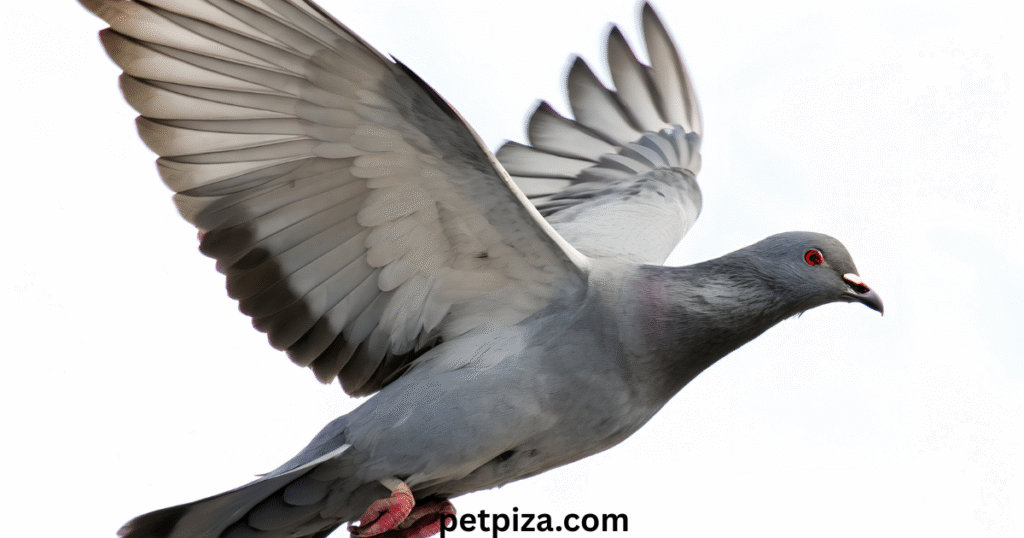
Hygiene and Cleaning
Although pigeons themselves require no bathing, in the wild they require support to keep their feathers in good condition and maintain a reasonable level of cleanliness.
- Daily: Change and refill the water, the food, and remove as many of the droppings as is practical.
- Weekly: Change all bedding, through cleaning the entire cage or loft, and scrubbing down the perches, toys, and any other items kept in the cage.
- Bathing: Upon request the bird should be offered a bath dish about three times a week. This reduces the amount of dust available and bathed pigeons keep their feathers in far better condition.
Health Problems
Pigeons can be sick as well, so they need to be taken care of properly and monitored for any changes, such as fluffing of feathers, tiredness, changes in appetite, and change in droppings.
Pigeons can be suffering with:
- Canker: An Infection with a protozoan organism which causes a sore throat and lesions.
- Coccidiosis: A parasite which causes diarrhea and rapid loss of body weight.
- Respiratory Irons: Advanced stages of illness which can lead to respiratory problems.
- Head & Body: Exposed to external elements can lead to infestation of skin and entice flakes and lice.
Your problems can be reduced to a bare minimum with prevention. Most health problems can be solved to a large extent with a proper well balanced diet.
A correct avian veterinarian can be of a great help in these matters.
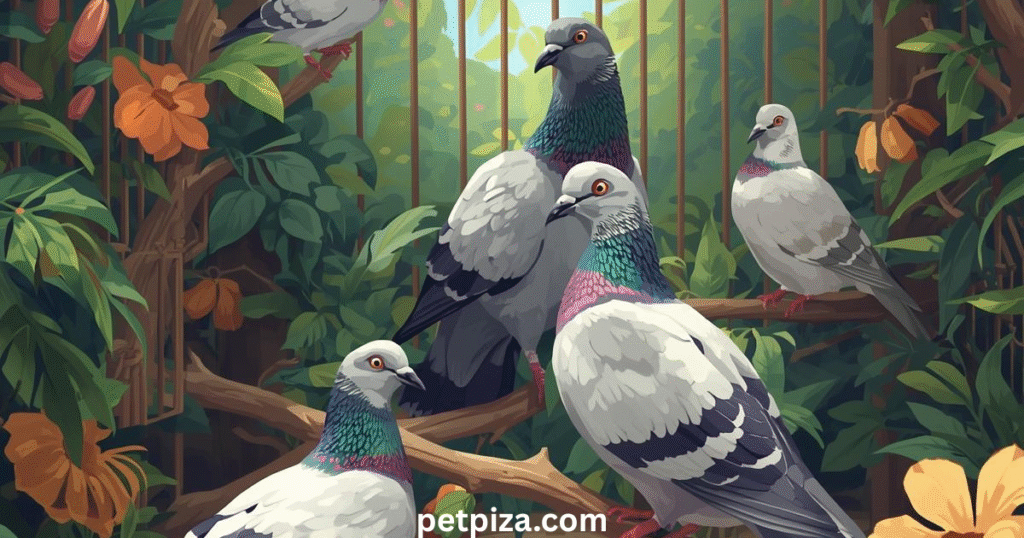
Pigeon Having Able to Fly with No Issues
Gaining the trust of your pigeon can take a lot of time and focus, so the best way to win it over is to sit with it and talk to it quietly.
When the time is right, the pigeon will come to you easily.
Rewarding the good behavior and strengthening the bond can be done with treats as well. The best way to properly guide the pigeon is to be calm and gentle. Keep the following in mind: Gradually and smooth, use your hand to slide your palm over the pigeons back until it gently rests above your knee. Keep the thumb and forefinger on the neck on either side to control the pigeon securely without any harm.
Training Pigeons
- Pigeons can be trained! One of the most useful behaviors to teach would be recall.
- To begin, say the pigeon’s name and give it a treat whenever it comes to them inside the enclosure.
- Once the behavior is reliable, practice in a safe, secure, and bird-proofed room.
- This is basic training for any home pet pigeon, but it is also a useful training method for bonding with any indoor pigeon.
A quick statement on the use of harnesses: Some pigeon owners will attach harnesses, or use what is referred to as “pigeon pants,” but this practice has the potential to be dangerous. Pigeons have delicate crops where food is stored, so a harness that is too tight can cause injuries, or impaction. If you decide to try one out, use extreme caution and ensure the harness is a perfect fit.
Sociability and Bonding
A pigeon tends to thrive on communal and social activities. A single pigeon will rely solely on the owner for social interactions, so be prepared to setup a daily routine for interaction with the bird. Pigeons are most often kept in pairs. A pigeon couple is a pleasure to observe as they will preen, coo, and comfort one another.
Cost Analysis of Pet Pigeons
Costs can differ significantly. Here is my attempt at analysis:
One time costs of pigeons include:
- Pigeons: Feeder Breeder costs, along with rescue fees, are lower. There are expenses of $120 – $100 depending on age of the pigeon.
- Housing: One can spend anything from $100 to over $1000. Large dog crates, along with custom outdoor lofts can cost this much.
- Supplies: Some feeders, waterers, and perches may cost $50 to $150.
The Monthly Ongoing costs are:
- Food, Grit and Supplement: $15 – $30
- Bedding: $10 – $20
- Pigeon Vet Fund: $20 – $40 should be set aside to visit the pigeon doctor, is advisable.
Pigeon Breeds Ideal For Beginners
Any rescued domestic pigeon can become a fine pet, yet a few pigeon breeds still stand out as particularly friendly.
- Fancy Pigeons: Pigeons specifically bred to make and admire, such as Old German Owls, Fantails, and Jacobins are particularly gentle. This fancy pigeon breeds are highly regarded for their lovable disposition and are often chosen as ideal pets.
- Homing Pigeons: Also known as ‘homers’ for their loving and affectionate nature, are bred primarily for their navigation skills. Retired racers, along with young non competitive males, become incredible companions and are great for pet lovers.
- The King Pigeons: This large and gentle mate utility pigeon is ideal for cage pet lovers as they are highly calm, relaxed, and steady while being affectionate.
Conclusion: Are pet pigeons the right choice for you?
A pet pigeon is not the most common pet people have, however, for the right person, it can be an amazing companion. They can provide affection, an interesting personality, and the ability to be quiet, all of which can improve your life for years. Becoming a pet owner entails providing a safe environment, a proper diet, and daily social interaction. If you are ready to appreciate their needs and their gentle nature, a pigeon is the pet you are looking for.
Commonly Asked Questions
1. Do pet pigeons have a smell?
Pigeons are not smelly creatures, especially when given the chance to take a bath. Usually, any smell coming from them can be attributed to an unclean cage or loft. However, with the proper daily and weekly cleaning, there should be not smell.
2. Can pet pigeons cohabitate with other pets?
It depends on the other pet. Cats and dogs with a high prey drive can present a significant problem to a pigeon. In those cases, all interactions should be watched closely. Pigeons can sometimes get along with other birds, but these introductions should be done slowly and with care.
3. Are pigeons messy?
Messiness comes with pidgeons’ eating habits when they scatter seeds and their fine dander known as ‘pigeon dust”. ‘Pigeon ‘dust’ can be controlled with a filter and routine cleaning and other dander can be managed with a fine air purifier.
4. How long can you leave a pet pigeon alone?
Pigeons can be left alone with enough food and water for them for a long weekend. They do appreciate companionship and social interaction so they could be left alone for a few days without much concern for their social needs. Longer trips require a bird sitter.
